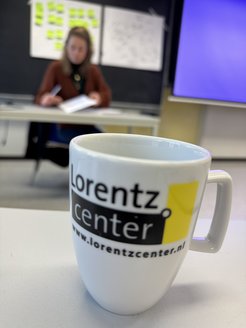Thinking Outside the Box: Workshop on Bringing Technology to Justice Involved Youth
Scientific Fields and Minds Came Together at the Lorentz Center (January 13–17, 2025)
The Lorentz Center in Leiden is known for hosting international, diverse, and daring workshops. What better venue could there be for Max Planck director and criminologist Jean-Louis van Gelder to showcase cutting-edge approaches to crime prevention? The virtual reality expert co-organized the one-week workshop “Bringing Technology to Justice Involved Youth”, which took place last week (January 13–17, 2025).

Research in the Department of Criminology at the Max Planck Institute for the Study of Crime, Security and Law seeks to connect theory, innovative methods, and technology to policy and practice. One focus is on state-of-the-art solutions of an applied nature, namely devising instruments and technologies such as Virtual Reality (VR), smartphone applications (apps), and wearables, which offer unique opportunities for the assessment and treatment of criminal offenders or potential offenders.
Effective assessment methods and treatments are especially important for justice involved youth and can be decisive in preventing (re)offending and ensuring successful (re)socialization. However, the use of novel technologies among justice involved youth is still limited. This seems a missed opportunity, particularly as youths, being digital natives, are more likely to embrace and feel comfortable with technology.
A one-week workshop at the Lorentz Center in Leiden/The Netherlands addressed how to stimulate innovation and research in the use and applicability of technology within juvenile justice settings. Prof. Jean-Louis van Gelder and Dr. Esther Mertens, both of the Max Planck Institute, were among the scientific organizers. The “think tank approach” taken at the Lorentz Center was particularly suited to this domain of methodological innovation, the aim being to translate crime science into practice and develop well-reasoned and practical solutions to complex challenges.
Topics covered during the one-week workshop also included clinical needs, ethical considerations, and futuristic ideas. The insights gained during last week will be compiled into a position paper, outlining a roadmap for future research into technological applications for the assessment and treatment of justice involved youth.
The workshop was part of the Lorentz Center’s collaboration with the Netherlands Institute for Advanced Study in the Humanities and Social Sciences (NIAS).
